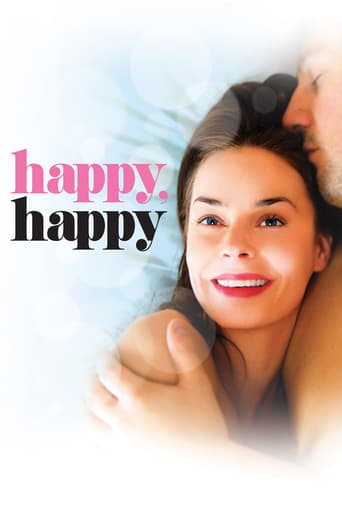

Really Surprised!
... View MoreIt's entirely possible that sending the audience out feeling lousy was intentional
... View MoreThere is just so much movie here. For some it may be too much. But in the same secretly sarcastic way most telemarketers say the phrase, the title of this one is particularly apt.
... View MoreThe movie turns out to be a little better than the average. Starting from a romantic formula often seen in the cinema, it ends in the most predictable (and somewhat bland) way.
... View MoreKaja is an unrelenting cheerful person. She's a teacher. Her husband Eirick is a jerk. For example, he and their son play a silent-treatment game which they know infuriates her. Couple Elisabeth and Sigve move in next door with their adopted African boy Noa. One night, Sigve brings out a box called The Couples Game. Kaja and Eirick have a tough time with the game. Kaja reveals to Sigve that they haven't had sex for a year. Sigve tells her that Elisabeth cheated on him. Sigve and Kaja start a secret affair.This indie is a little bit slow at times. Kaja is a great character. The actors are all good. There is some relationship fun. Then there is one too many reveal twist with Eirick. Instead of emotional intensity, it becomes a sudsy endeavor. I can do without that final twist. The humor doesn't always work.
... View MoreHappy, Happy (2011)This is a modest film, for sure, and if you take the basic element of it, it's a story told many times. But it's told very well, and it has two extra layers that give it a really odd, pointed humor and pathos (both). You might reduce it all by saying: how Scandinavian. Maybe.Most of the plot is simple. A sophisticated city couple move to the country to live for awhile. (We are never sure why, and they don't work, but it's more than just a holiday.) The wife (played by the chiseled Danish t.v. actress Maibritt Saerens) is reluctant in the opening scene, but the ground is covered with snow and it seems like a necessary adventure.They rent a little house from a country couple who live next door, and the most famous star of the movie is this woman, a simple and idealistic kind of woman (Agnes Kittelsen). She must be the reason for the movie, because she is naive to the point of blindness to her situation (or so we are led to think). Her husband is a slightly abusive guy who gets their son on his side in affairs.The city couple/country couple dynamic is nothing new, and it has some of the familiar expected results, including a genuine mutual admiration between the two women (one appreciating country life, the other admiring urban chic). But a rivalry also is brewing, and some infidelity results. With the nice new complication of a gay element, which I will leave vague and simply say that it happens in a very natural and almost normal way.This is all pretty good stuff, and the making of a simple but satisfying human drama. The two additional layers change the tone of it all. The first is almost silly you would think, but in little inserts, artificially and comically positioned as markers, is a kind of Greek chorus—played by a Scandinavian barbershop quartet in English. It's hilarious and surreal. And it makes you reflect on the events as theater, not quite as a depiction of real people.The other layer is tougher to take, and is given brief but critical screen time. The country couple has a boy of their own, and the city couple has an adopted Ethiopian child about the same age. In an apparently innocent way, the white child plays slave master to the black child, who plays slave (willingly, and with no serious physical harm). The dynamic is chilling to a viewer, and only slowly do the parents catch on (partly because they are all absorbed in their own drama). There is a terrific five second resolution to this near the end, by the city woman, and as cruel and crude as it seems, it's perfect and necessary. And it cuts through all the other crap, somehow, too.By the end you see a kind of fable played out, and it might be a bit simple, but it's sweet and sad and funny enough to work. I liked this more than I thought I would at first.
... View MoreThere are four main characters in Happy, Happy because it is about two couples; however, one of them really shines through and becomes such a pleasure to watch that it really does not matter what happens with the plot or any of the other players, she is just stunning. I am talking about Agnes Kittelsen who plays Kaja. She is almost always smiling, even when there are situations when there is nothing to smile about. She exudes positive energy and cannot help it when her actions either makes someone else around her happy or rubs someone else the wrong way.Kaja is married to Eirik (Joachim Rafaelsen) and they appear to live in the middle of nowhere Norway. They not only own their own house, but also the one next door which they rent out to people who are usually looking to get away from the city. A city couple from Denmark does exactly that when they abruptly shift from urban to rural. The new couple next door is Sigve (Henrik Rafaelsen) and Elisabeth (Maibritt Saerens). Since there is not much else to do in the immediate locale, the two couples start sharing dinners together and playing games. These games lead to uncomfortable couple comparisons which is never a good thing. Comparing your relationship to someone else's is not the way to end the evening on a high note.During one game, it emerges that Kaja and Eirik have not had sex in over a year and that Elisabeth has recently cheated on Sigve which was a catalyst in their decision to escape to the countryside. The couples also notice the personality clashes and matches around the dinner table. Kaja and Sigve are naturally extroverted and outwardly positive. Elisabeth and Eirik are much more reserved and while not necessarily secretive, they do not have the impulse to share their feelings around the room. These situations and personalities obviously set up what may lead to adulterous liaisons, secrets, and acrimony. However, this is not a heavy handed drama about adultery and revenge. There are laughs, comedic scenes, and an overall light air around the decisions these couples make in response to one another.Each couple also has a son, although Sigve and Elisabeth's son is adopted and black. There are scenes between the two boys, who seem to be around seven years old, which do the film no credit and do not fit. Their sequences are only peripheral to the plot and have no bearing on any central themes, which is all the more puzzling why they are even there. Their interactions disrupt the light flow and mood of the movie and should either be completely rewritten or just taken out.Happy, Happy won the Grand Jury Prize for Dramatic World Cinema at this year's Sundance Film Festival and is also Norway's official submission for the 2012 Academy Awards. It approaches its characters with maturity and understanding, characteristics true for most Scandinavian films but frequently lacking in American ones. It is also challenging to classify Happy, Happy as just a comedy or a drama. There are not very many jokes or moments to laugh at but there are also very few emotional moments which aim for true drama either; it carves out a distinct middle ground.I recommend Happy, Happy for those of us who like Scandinavian films and appreciate movies which take their characters seriously. Thank goodness there are no slapstick moments here which would not fit and no downright weepy 'woe is me' segments. Just lose the scenes with the kids and then you would really have a heck of film on your hands.
... View MoreThe original title "Sykt lykkelig" is a nice pun, as "sykt" can be both positive (thus the title meaning "incredibly happy") or negative (more like "happy in a sick way").Indeed this dichotomy runs throughout the movie. Two couples live next door, but their initial attempt to establish a good neighbourhood relationship goes awry, as neither family is as picture-perfect as the facade suggests.Soon enough they find themselves in the middle of an awkward love triangle, almost turning into a double-triangle, and then shortly into partner swapping.In the end the ordeal brings every character back to square one, but with renewed, and this time hopefully complete, awareness of themselves and of their partner. So everything looks the same as before, but something has definitely changed.We're left to wonder who was "happy" and about what and when... And is it supposed to be ironic? I'm not really sure, and it's a positive thing. A movie that keeps me thinking after it's over, with no convoluted gimmicks and with no clean-cut answers is a good movie to me.Sykt lykkelig is a difficult movie to categorize... In a way it's the typical Norwegian "comedy": more awkward than funny, with a persistent serious vibe that runs through the movie but never takes over. So the movie is always enjoyable, even when it could get too heavy-handed, gloomy or sappy. Of course this minimalistic approach can be a negative aspect, depending on the viewer's taste and on his penchant for full-fledged drama or for unrelenting pretentiousness.Just to make two examples: the subplot involving the two kids, with openly racist undertones, is quite perplexing but it's an odd change of pace from the main story. And the confrontation scene between Kaja and Eirik about his "hunting trips" is a farcical tribute to Brokeback Mountain... In order not to talk openly about the topic in front of the kid they switch to a very broken German, which doesn't sound too different from Norwegian, and the key word of the whole scene is still said loud in Norwegian... So much for not upsetting the kid! If it was intentional, it was hilarious.To sum it up "Sykt lykkelig" is a somewhat odd and uneven family "comedrama", Its forte is the absence of maudlin introspection. For once we're just watching the four characters deal with their live and their choices. No preachy message is spoon-fed to us, no easy answers are given... Quite a rare occurrence in such movies.
... View More